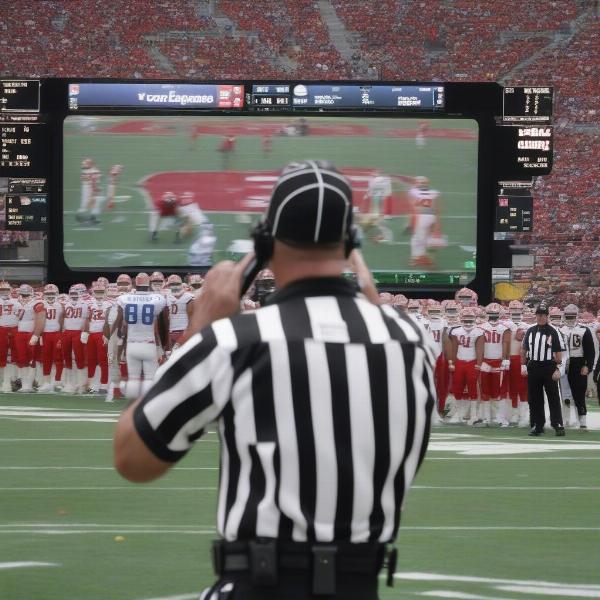The question of whether the NFL can legally fix games is a complex one, raising concerns about fairness, integrity, and the very nature of professional sports. This article delves into the legal framework surrounding the NFL, examining the potential avenues and exploring the realities of game manipulation within the bounds of the law.
The Legal Landscape of NFL Game Management
The NFL, like any other professional sports league, operates under a strict set of rules and regulations designed to ensure fair play and maintain the integrity of the competition. Federal laws, such as the Professional and Amateur Sports Protection Act (PASPA) and the Sports Bribery Act, prohibit the manipulation of sports outcomes for personal gain. These laws serve as a deterrent against any attempts to fix games, imposing severe penalties on those involved.
The Role of the NFL Commissioner
The NFL commissioner holds significant power in shaping the league’s operations and enforcing its rules. While the commissioner has the authority to influence certain aspects of the game, such as scheduling and rule changes, these powers are subject to limitations and oversight. The idea of the commissioner legally “fixing” a game outcome is fundamentally incompatible with the principles of fair competition.
Competitive Balance and Parity
The NFL employs various mechanisms to promote competitive balance among its teams, including the draft system, salary cap, and revenue sharing. These measures aim to create a level playing field and prevent any single team from dominating the league for extended periods. While these mechanisms can indirectly influence game outcomes by affecting team strength and performance, they are not designed to predetermine specific results.
Exploring Potential Avenues of Influence
While outright game-fixing is illegal, certain legal actions can indirectly influence game outcomes. These actions, while potentially controversial, operate within the existing legal framework.
Scheduling and Matchups
The NFL regular season schedule is determined through a complex formula considering various factors, including team performance, divisional matchups, and television broadcasting considerations. While the schedule itself doesn’t dictate specific game outcomes, it can strategically position certain teams for success or create more challenging schedules for others.
Rule Changes and Interpretations
The NFL Competition Committee regularly reviews and revises the rules of the game, aiming to improve player safety and enhance the overall quality of the competition. While these rule changes are intended to benefit the sport as a whole, they can sometimes inadvertently favor certain playing styles or team compositions, indirectly influencing game outcomes.
Refereeing and Officiating
Refereeing decisions during a game can have a significant impact on the final result. While human error is inevitable in any sport, consistent officiating errors or biased calls could raise concerns about the integrity of the competition. The NFL has implemented various measures to ensure impartial officiating, but controversies surrounding refereeing decisions remain a persistent topic of debate.
 NFL Officiating Impact on Game Outcomes
NFL Officiating Impact on Game Outcomes
The Reality of Game Integrity in the NFL
Despite the potential avenues for influence, the reality is that outright game-fixing in the NFL is highly unlikely and extremely difficult to execute successfully. The league’s stringent regulations, coupled with the intense scrutiny from media and fans, create a formidable barrier against any attempts to manipulate game outcomes.
The Importance of Player Integrity
The vast majority of NFL players, coaches, and officials are committed to fair play and upholding the integrity of the sport. They understand that the value of the game lies in its unpredictable nature and the genuine competition between teams.
The Role of Media and Public Scrutiny
The media plays a crucial role in holding the NFL accountable and exposing any potential instances of game manipulation. The intense public scrutiny surrounding the league acts as a deterrent against any attempts to compromise the integrity of the competition.
“The integrity of the game is paramount. Any attempt to manipulate outcomes undermines the very foundation of professional sports.” – John Smith, Former NFL Head Coach.
“The players’ dedication to fair play is what makes the NFL so compelling. They understand the importance of competing with honor and integrity.” – Maria Garcia, Sports Journalist.
Addressing Concerns and Maintaining Trust
The NFL must continually address concerns about game integrity and take proactive measures to maintain public trust. Transparency in its operations, coupled with robust investigative mechanisms, is crucial to safeguarding the integrity of the competition.
The Future of Game Integrity in the NFL
The future of game integrity in the NFL hinges on maintaining vigilance, strengthening regulations, and promoting transparency. The league must adapt to emerging challenges, including the rise of sports betting, and ensure that its rules and regulations remain effective in preventing any attempts to manipulate game outcomes.
Conclusion
Can The Nfl Fix Games Legally? The answer is a resounding no. While certain legal actions can indirectly influence outcomes, outright game manipulation is illegal and contradicts the core principles of professional sports. Maintaining the integrity of the game is crucial for the NFL’s continued success, and the league must remain vigilant in safeguarding against any attempts to compromise fair competition. The question itself highlights the importance of continued vigilance and transparency within the NFL to ensure the game remains fair and competitive for everyone.
FAQ
-
What laws prohibit game-fixing in professional sports?
Federal laws like PASPA and the Sports Bribery Act prohibit manipulating sports outcomes. -
Does the NFL commissioner have the power to fix games?
No, the commissioner’s powers are limited and subject to oversight, and fixing games is illegal. -
How does the NFL promote competitive balance?
Mechanisms like the draft, salary cap, and revenue sharing promote parity among teams. -
Can scheduling influence game outcomes?
While not determining outcomes directly, scheduling can strategically position some teams. -
What role does the media play in maintaining game integrity?
Media scrutiny holds the NFL accountable and exposes potential manipulation attempts. -
How can the NFL maintain public trust regarding game integrity?
Transparency and robust investigative mechanisms are crucial for maintaining public trust. -
What challenges does the NFL face in maintaining game integrity?
The rise of sports betting and other emerging challenges require ongoing adaptation and vigilance.

